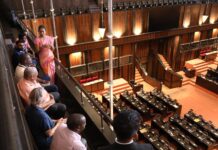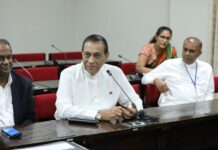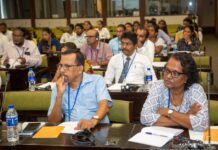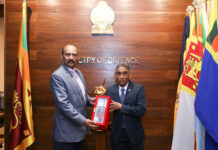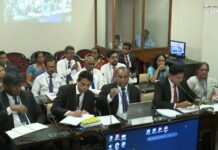Labour and Foreign Employment Minister Manusha Nanayakkara emphasized today (29) that addressing the economic challenge was like a ‘suicide mission,’ highlighting the Government’s successful completion of the task of restoring the economy to normalcy.
Minister Nanayakkara noted that an uninformed group believes that bringing down inflation, improving exchange rates, and increasing salaries can be achieved during an election to gain an advantage, which clearly proves that such groups are being misled. He pointed out that recent statistics indicate the President has successfully tackled the economic challenges.
The Minister expressed these views during the inauguration of the Jayagamu Sri Lanka program at Gamini Vidyalaya’s Ground in Vavuniya.
The Minister also went on to say;
“When we talk about Jaffna, it brings to mind the Northern Province; mentioning Trincomalee evokes thoughts of the Eastern Province. However, when Vavuniya is mentioned, the sense of connection is even stronger. Let’s look at the map of Sri Lanka to pinpoint Vavuniya’s location. Vavuniya can be likened to the neck of Sri Lanka, making your city a crucial link between the south and the north.
Before King Vijaya arrived in Sri Lanka, the country was ruled by local kings. Subsequently, the Chola invasion brought these areas under their control. Later, the Pandyas ousted the Cholas and ruled over Vavuniya. It is widely acknowledged that Hemamala and Prince Dantha brought the Dalada (Tooth Relic) through this region. Historians cite the Dalada Maliga in Madukande as evidence of this historical event.
The Vanniyars ruled this province as far back as the 13th century, before British rule began. They maintained contact with the regional rulers of Jaffna. Today, approximately 80 percent of Vavuniya’s population consists of Tamil speakers, while Sinhala speakers make up about 20 percent.
Sri Lanka is akin to an open-air museum, brimming with historical significance in every corner, representing diverse ethnicities. It is the government’s responsibility to safeguard this rich heritage. Examining Vavuniya’s history reveals a unique aspect compared to other provinces. While rulers may have changed over time, the bond among its people remained constant, symbolizing enduring relationships. Vavuniya stands as a testament to friendship and unity.
Today, President Ranil Wickramasinghe is working towards building a unified nation. Instead of repeating history’s divisive mistakes, such as imposing Sinhalese as the sole official language, which led to divisions and created rifts between races, I am committed to ensuring equitable distribution and fairness across every region of the country.
There are many lessons to be learned from the people of the north, as I have mentioned in Jaffna too. The people in the south faced a shortage of fuel and gas, which eventually turned into an ‘Aragalaya’ across the country. The people in the north endured oppression for about three decades.
Today, many leaders are stepping forward to lead the country and save the nation. However, during the economic crisis, no one came forward to take charge. There was no new Lee Kuan Yew or Mahathir Mohamad at that time. When the situation was dire, only one fearless leader took over the country. That leader is President Ranil Wickremesinghe.
As of July 2022, the country’s reserves were $1,815 million. By February of this year, we have increased foreign reserves to $4,491 million. Some argue that this increase is due to our strategy of not paying off debts. However, we have started to repay our foreign debt other than International Sovereign Bonds (ISBs). We have also opened up imports except for private vehicles. Additionally, migrant workers have been granted the opportunity to import private vehicles.
In the fourth quarter of 2022, the gross domestic product was negative at minus 12.4. However, we were able to turn it into a positive value. By the fourth quarter of last year, we had managed to grow it to positive 4.2.
In the year 2022, 52 major state-owned enterprises in the country were experiencing significant losses. The Ceylon Petroleum Corporation (CPC) paid the salaries of the employees using public tax money. These enterprises collectively suffered a loss of Rs 744,658 million. However, by April 2023, those institutions were turned profitable. Today, these institutions have generated a profit of Rs 144,224 million.
When we accepted the challenge, inflation had risen to 70-80 percent. By July 2022, inflation had decreased to 60 percent. As of today, we have managed to reduce it to a single-digit value, with current inflation standing at 5.9 percent.
When we took over the government, one dollar was worth 380 rupees. There were predictions that the dollar could reach 500, 600, or even 700 rupees. Economic experts doubted where the dollar would stabilize, with some suggesting extreme scenarios like needing a wheelbarrow full of money to buy a loaf of bread. However, today, we have successfully brought the dollar down to the level of 290 rupees.
By May 2022, the amount of remittances sent by expatriate workers had dropped below $200 million per month. In the first two months of 2023, the country received $845 million. However, in just the first two months of this year, migrant workers have sent $964 million. Consequently, since we took over, the country has received $10 billion in foreign remittances.
Following remittances from expatriate workers, tourism stands as the country’s largest source of dollars. In 2022, the country welcomed 178,000 tourists. However, in the first two months of this year alone, the number of tourists has exceeded 400000. During the same period in 2023, tourism revenue rose from $332 million to $688 million.
During this period, the cabinet has made significant decisions regarding employee salaries. While government employees are receiving salary increases, the minimum wage for private sector employees has also been raised from 12,500 rupees to 17,500 rupees, representing a 40 percent raise. This increase includes the 3,500 rupees granted through budget concessions, resulting in a new minimum basic salary of 21,000 rupees. Additionally, adjustments have been made to employees’ ETF and EPF benefits as well. Plantation workers have also voiced their demands for higher wages, prompting the President’s intervention. Despite disagreements between estate unions and employers regarding salary hike proposals, the Ministry is actively working to address these concerns.
Now when we are doing these things, some people say that the election is coming. We tell them. When a vote comes, if we can reduce inflation, if we can increase the value of the rupee, if we can increase wages in this way, we say let’s always have elections, then we can give more relief to the people. I remind you that it is a group of idiots who can’t even understand basic economic principles supporting certain political movements.”





